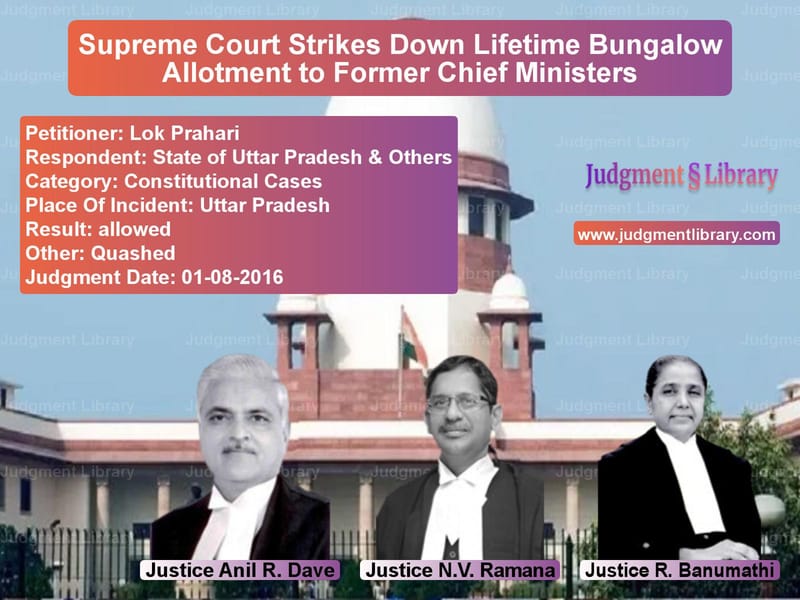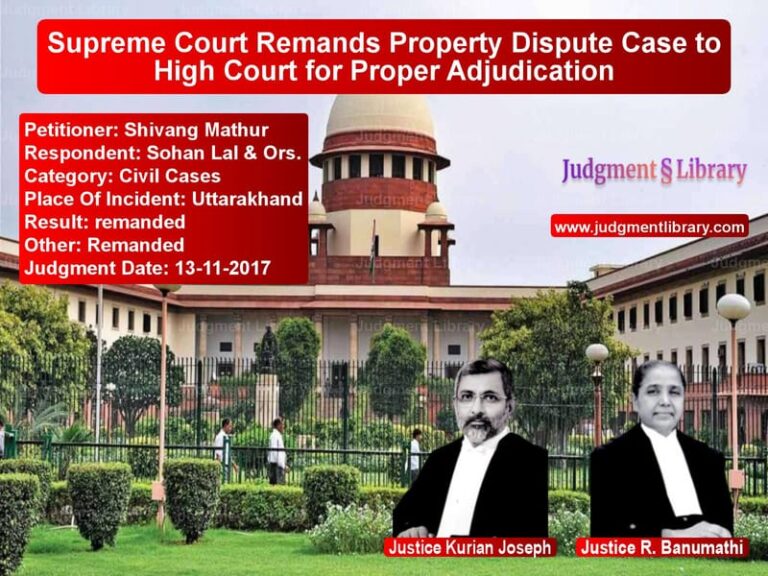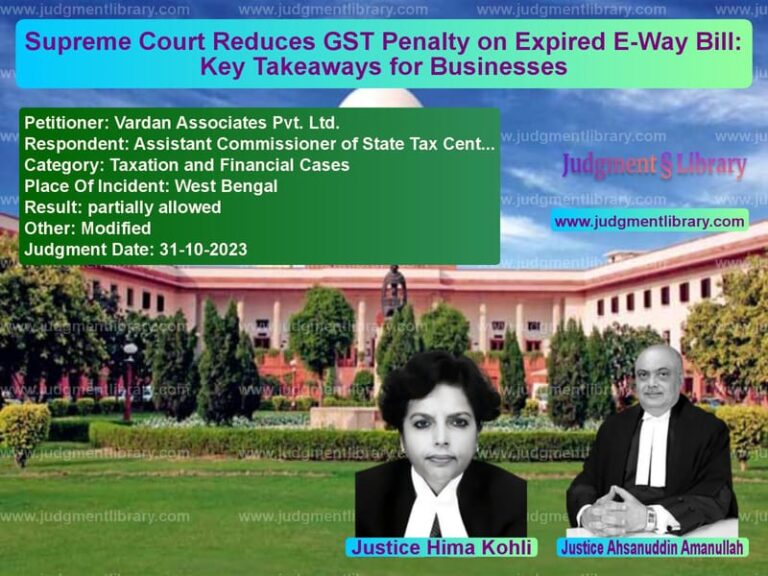Supreme Court Strikes Down Lifetime Bungalow Allotment to Former Chief Ministers
The case of Lok Prahari v. State of Uttar Pradesh brought an important question before the Supreme Court: whether former Chief Ministers could legally occupy government bungalows after demitting office. The judgment, delivered on August 1, 2016, by Justices Anil R. Dave, N.V. Ramana, and R. Banumathi, struck down the 1997 Rules that allowed lifetime government accommodation to former Chief Ministers. The Court held that such a privilege was arbitrary, discriminatory, and against the provisions of the Uttar Pradesh Ministers (Salaries, Allowances and Miscellaneous Provisions) Act, 1981.
Background of the Case
The petitioner, Lok Prahari, a registered society working for public welfare, filed this writ petition challenging the validity of the Ex-Chief Ministers Residence Allotment Rules, 1997. The petition argued that these rules, which allowed former Chief Ministers of Uttar Pradesh to retain government bungalows indefinitely, were illegal and unconstitutional.
Initially, there were no formal rules allowing former Chief Ministers to occupy government bungalows after leaving office. However, during the pendency of a prior petition, the State of Uttar Pradesh framed the 1997 Rules, which permitted lifetime occupancy of government bungalows by former Chief Ministers. The rules also stated that, upon the death of a former Chief Minister, their family members had to vacate the bungalow within three months.
Petitioner’s Arguments
Lok Prahari presented the following key arguments:
- No Legal Basis: The 1981 Act governing Ministers’ salaries and allowances only allowed a Minister to retain official accommodation for 15 days after demitting office. There was no provision granting lifetime residence.
- Violation of Article 14: The rules discriminated against other constitutional functionaries like the Chief Justice, Speaker, and Governor, who were not given similar privileges.
- Public Property Misuse: Government bungalows were being allocated to private trusts and organizations without justification or charging proper market rent.
- Precedents Ignored: The Court’s ruling in Shiv Sagar Tiwari v. Union of India (1997) had held that public property should not be allotted to private individuals or organizations without adequate consideration.
Respondent’s Arguments
The State of Uttar Pradesh defended the 1997 Rules with the following arguments:
- Policy Decision: The State had the executive authority to decide on housing for former Chief Ministers.
- Security Reasons: Some former Chief Ministers had ‘Z+’ security cover, requiring them to stay in government accommodations.
- Federal Structure: The government cited provisions that allow former Presidents and Prime Ministers to retain official residences.
Supreme Court’s Observations and Ruling
The Supreme Court categorically rejected the State’s defense and ruled in favor of the petitioner. The key observations made by the Court were:
1. The 1997 Rules Contradict the 1981 Act
The Court stated:
“The 1981 Act specifically limits the period for which a Minister, including the Chief Minister, can retain government accommodation. It does not provide for lifetime allotment.”
Since the 1997 Rules were merely executive instructions and not statutory, they could not override a law enacted by the legislature.
2. Violation of Article 14 (Right to Equality)
The Court found that the rules gave preferential treatment to former Chief Ministers without any rational basis:
“If Judges, Governors, and other constitutional dignitaries do not enjoy such a privilege, there is no justification for allowing former Chief Ministers to retain government bungalows indefinitely.”
3. No Justification Based on Security Concerns
The Court rejected the argument that security concerns justified continued occupation:
“Security is a concern of the central government, and accommodations for those under threat can be arranged separately. It does not justify permanent allotment of public property.”
4. Misuse of Public Resources
The judgment emphasized that the allotment of public property must be done transparently and in accordance with the law:
“Allotment of government properties without adequate consideration results in loss to the public exchequer and cannot be allowed.”
Final Verdict
The Supreme Court quashed the 1997 Rules and directed:
- Former Chief Ministers must vacate their government bungalows within two months.
- The State Government must recover appropriate rent for the period of unauthorized occupation.
- Government properties allotted to private trusts or organizations without statutory backing must be reclaimed.
Key Takeaways
- The Supreme Court upheld the principle that public property cannot be arbitrarily allotted.
- Executive orders cannot override statutory provisions.
- Allotments must be based on legal provisions and not discretionary power.
- Government bungalows must be reserved for serving officials, not former functionaries.
Impact of the Ruling
The ruling had a major impact on governance and public accountability in India. It:
- Ensured the return of government properties to the State.
- Set a precedent for challenging arbitrary executive decisions.
- Encouraged better utilization of public resources.
In conclusion, the Supreme Court’s ruling in Lok Prahari v. State of U.P. reinforced the sanctity of public property and the need for legal backing in government policies. It established that former Chief Ministers are not entitled to lifelong government accommodation and reaffirmed the constitutional principle of equality before law.
Don’t miss out on the full details! Download the complete judgment in PDF format below and gain valuable insights instantly!
Download Judgment: Lok Prahari vs State of Uttar Prade Supreme Court of India Judgment Dated 01-08-2016-1741878413711.pdf
Direct Downlaod Judgment: Direct downlaod this Judgment
See all petitions in Public Interest Litigation
See all petitions in Judgment by Anil R. Dave
See all petitions in Judgment by N.V. Ramana
See all petitions in Judgment by R. Banumathi
See all petitions in allowed
See all petitions in Quashed
See all petitions in supreme court of India judgments August 2016
See all petitions in 2016 judgments
See all posts in Constitutional Cases Category
See all allowed petitions in Constitutional Cases Category
See all Dismissed petitions in Constitutional Cases Category
See all partially allowed petitions in Constitutional Cases Category







